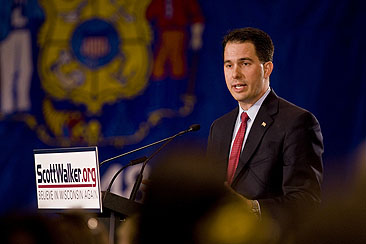 Lately Scott Walker has been asked:
Lately Scott Walker has been asked:
- Whether he agrees with Rudy Giuliani’s comment that President Obama doesn’t love America.
- Whether he believes in evolution.
- Whether he believes that Obama is a Christian.
Is this fair? Why is Walker being peppered with gotcha questions like this? Are Democrats getting the same treatment?
There are no Democrats running for president yet, so it’s hard to say what kind of questions they’re going to be asked. But if Hillary Clinton attends a fundraising dinner where, say, Michael Moore suggests that Dick Cheney should be tried as a war criminal, I’m pretty sure Hillary will be asked if she agrees. And asked and asked and asked.
As for the other stuff Walker is being asked about—evolution, climate change, Obama’s religion, etc.—there really is a good reason for getting someone like Walker on the record. He’s basically a tea party guy who’s trying to appear more mainstream than the other tea party guys, and everyone knows that there are certain issues that are tea party hot buttons. So you have to ask about them to take the measure of the man. Sure, they’re gotcha questions, but they have a legitimate purpose: to find out if Walker is a pure tea party creature or not. That’s a matter of real public interest.
Conservatives are complaining that Walker is facing a double standard. Maybe. We’ll find out when Hillary and the rest of the Democratic field start campaigning in earnest. But I’m curious. What kinds of similar questions would be gotchas for Democrats? Drivers licenses for undocumented workers? Support for single-payer healthcare? Those aren’t really the same, but I can’t come up with anything that is. It needs to be something that’s either conspiracy-theorish or else something where the liberal base conflicts with the scientific consensus, and I’m not sure what that is. GMO foods? Heritability of IQ? Whether George Bush stole the 2004 election by tampering with voting machines? I’m stretching here, but that’s because nothing really comes to mind.
Help me out. What kinds of Scott-Walkerish gotcha questions should reporters be saving up for Hillary?

















